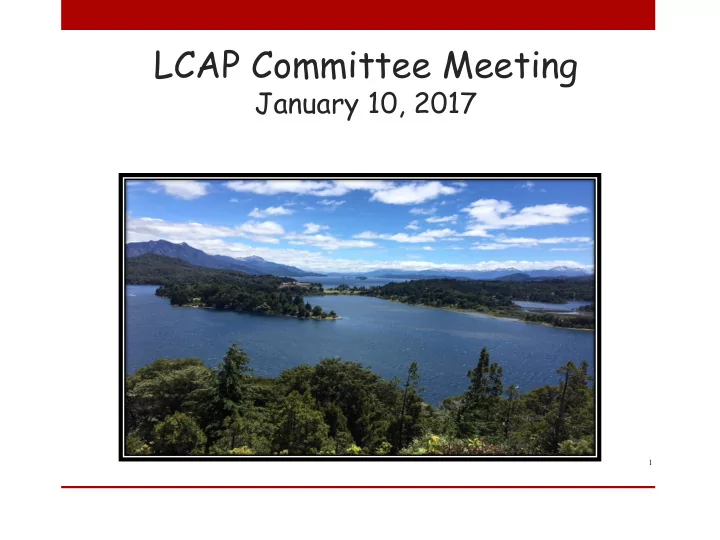

LCAP Committee Meeting January 10, 2017 1
Meeting Outcomes • Understand how the following data will used to analyze needs for the LCAP that will be written for the next three years: School survey results LCFF Rubrics provided by the State Upcoming initiatives and focus areas • Review and revise survey questions. • Learn recent developments in state accountability and its role in the LCAP. • Understand next steps. 2
Agenda Topic Focus Question Time Agenda, Outcomes 3:15-3:20 Review Data Source 1: How do surveys need to be 3:20-3:50 School Surveys revised? Data Source 2: How will LCFF Rubrics inform the 3:50-4:10 LCFF Rubrics LCAP? Data Source 3: What’s coming up that we need to 4:10-4:25 Future Initiatives, Focus plan for? Areas, Adoptions Next Steps What happens between now and 4:25-4:30 the next committee meeting? 3
Purpose of the Survey The LCAP process requires feedback and input is from staff, parents and students on: • The impact and effectiveness of activities and services being implemented; • The activities and services that need to be continued, revised or added. • How feedback from stakeholders was used to develop the updated Plan. 4
Who will provide feedback? Schools: Principals, teachers, other staff Parents: Parent EL-PAC Committee, all parents (link on PUSD Website) Students: Student focus groups 5
Overview of Survey • Survey reflects the key components of the LCAP’s activities and services for Supplemental/Concentration funds. Not every service is reflected in the survey. • Participants complete the section that applies to their school level, ie elementary, middle, high school. • Selected response (bubble) and constructed response (written) questions. • Administered via Survey Monkey. 6
Table Task Review the survey questions for your table’s assigned grades: K-5: pages 1-2 and 5 6-8: pages 3-4 and 5 9-12: pages 4-5 7
Table Reports As a table group, create a Thinking Map that answers this question: Do these questions need to be revised? Does anything need to be added? 8
New System for Accountability California’s state accountability system is changing dramatically. The new system: Is based on the 8 state priorities outlined in the LCAP. Includes multiple measures for academic indicators as well as other indicators such as suspension rates, college and career readiness and school climate. Calculates district and school performance based on how a school/district status (performance) and the amount of change (improvement) over one year and in some cases 3 years. Applies lessons learned from NCLB; focuses on continuous improvement and growth. Aligns local, state and federal requirements to create a single integrated system. State accountability (LCFF*) = federal accountability (ESSA**). 9
State Accountability: Recent Developments November, 2016: State Board reviewed recommended cut points for SBAC and requested they be set by Scale Score rather than percent of students meeting standard. December, 2016: State Board holds special session to review four options for setting cut points recommended by technical advisory group. 10
State Accountability: Recent Developments On January 11 th , the State Board will review recommendations on: Revised cut points for grades 3-8 SBAC using Scale Scores that are based on “Distance from Level 3”. How to define “English Learners” for purposes of showing progress in SBAC. Options for how districts can show progress in two indicators that are reported at the local level: 1) Implementation of State Academic Standards; 2) Parent Engagement. 11
Next Steps If new recommendations are approved, CDE will release rubrics with pre-populated data to districts and schools. We will review this information to identify needs and allocate resources in LCAP. 12
Table Talk What questions do you have about this information? 13
Upcoming Initiatives Some of the district initiatives that need to be included in the future LCAP are: PUSD’s Strategic Plan (currently being developed). Implementation of the High School Promise to expand 9-12 options. New textbook adoptions, ie, purchase Social Studies in 2017-18; Science in 2018-19. New courses to increase CTE and college preparation in middle and high school. 14
LCAP Committee Meetings Date Topic Focus November LCAP Committee Review services, activities implemented, Meeting updated metrics. January LCAP Committee Revise survey questions; review LCFF Rubrics and their role February 22, 2017 LCAP Committee Analyze school survey results Update on LCFF Rubrics March 29, 2017 LCAP Committee Analyze LCFF Rubric results for PUSD, if available from CDE. Analyze student, parent survey results. April 26, 2017 LCAP Committee Review, provide feedback to draft sections of plan. May 16, 2017 LCAP Committee Review, provide feedback to draft sections of plan. June Public Hearing June Board Approval By July 1 Submit LCAP 15
Next Committee Meeting: February 22 Topics: Analyzing Survey Results Update on LCFF Rubrics 16
Ticket Out the Door: What is one thing you learned today? 17
Recommend
More recommend